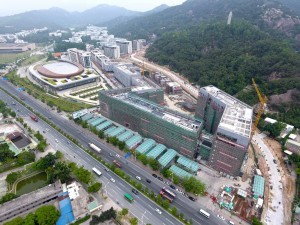President Prof. Peretz Lavie Elected to 3rd Term
History at Technion: President Prof. Peretz Lavie Elected To Third Term
Confirmed by the Executive Committee of the academic institution
Technion’s Academic Committee, comprised of all full professors, approved the continuation of President Prof. Peretz Lavie’s term in office by a large majority. The decision, which extends his office to a third term, was unanimously approved yesterday by the Technion Executive Committee. The decision must also be ratified by the Board of Governors, which will convene next month.
Prof. Lavie will be the first President in the history of Technion to be elected to a third term and will serve for more than eight years (with the exception of Amos Horev’s third term, which lasted for one year). Prof. Lavie, who took up the post in 2009, assented to a request by the Technion Executive Committee to extend his term in office by another two years. He did so out of a desire to complete a number of strategic development projects at the Technion campus in Haifa and the need to establish Technion’s branches in New York and China.
“I see the position of Technion President as the most important mission in my academic life,” said Prof. Lavie. “I will continue to work with all my might so that the glorious institution we are all so proud of will develop and thrive.”
During Prof. Lavie’s current term in office (2009-2017), Technion recorded impressive achievements led by the recruitment of more than 200 new faculty members. “Outstanding faculty members are the most important asset of any university,” said Prof. Lavie. “The quality of Technion and its future status will be determined first and foremost by the quality of its faculty members.”
The new faculty members, whose recruitment involved the extensive recruitment of resources, are mostly young and were selected based on excellence in research. The increase in the number of faculty members was accompanied by a significant increase in the number of publications in the world’s leading scientific journals. In 2016, Technion was ranked 26th in the world in the list of Rising Stars, published by the leading scientific journal Nature, following a 40% increase in Technion’s publications in leading scientific journals. In the Shanghai ranking, the world’s leading index of academic institutions, within eight years Technion shot up from rank 101-152 worldwide to 69th place in 2016: the top of Israel’s universities. These rankings, along with a significant increase in the awarding of research grants, attest to Technion’s academic excellence and the research achievements of its faculty members.
The research world, in Prof. Lavie’s view, is changing. In the past, a scientist could carry out research and achieve breakthroughs on his own, but now significant research requires interdisciplinary cooperation. “The walls between disciplines, faculties, and fields of research are collapsing,” explains Prof. Lavie. “Future achievements in science and engineering will require cooperation between laboratories and researchers from different fields. In order to achieve significant scientific and engineering breakthroughs, enormous knowledge is now required — knowledge that an individual scientist does not possess.” For this reason, Technion has worked to establish interdisciplinary centers where researchers from different faculties work together. These centers include research institutes such as the Technion Integrated Cancer Center (TICC), the Quantum Engineering Center, the Cyber Security Research Center, and the Technion Computer Engineering Center (TCE), in addition to the Excellence Centers of the Council for Higher Education that have been established at Technion.
The number of students at Technion is growing steadily. In the past eight years, the number of students has increased from 12,665 (2009-2010) to 14,121 (2016-2017). In addition, there has been a 30% increase in the number of graduate students (master’s and doctoral).
Since taking office as President, Prof. Lavie has worked to change the atmosphere at Technion and its image as a rigid institution that is not sufficiently considerate of its students. Under his leadership, a committee was established to examine the structure of studies and academic load at Technion, headed by Prof. Yachin Cohen of the Faculty of Chemical Engineering. The committee’s recommendations, which were implemented in conjunction with the Technion Student Association (TSA), included many changes aimed at improving teaching at Technion. In addition, in 2012 Prof. Lavie instituted the Yanai Prize for Excellence in Academic Education, with the generous donation of Technion alumnus Moshe Yanai. The prize, which is awarded in recognition and appreciation of faculty members who set an example by their contributions to teaching and learning, has already become synonymous with excellence in teaching at Technion and has been awarded to 62 faculty members and three faculties.
Along with improvements in teaching, Technion is also investing heavily in developing the infrastructure that serves students on campus. The boom includes the construction of dorms, classrooms, and study halls, and spaces designated for social, cultural, and sports activities. Thanks to the enormous investment in building student dorms and renovating existing ones, Technion now the leading academic institution in Israel in terms of housing solutions (beds) offered to its students.
Another impressive achievement recorded by Technion during Prof. Lavie’s term in office was the strengthening of its global standing. This achievement is reflected in the establishment of Technion branches in New York and China and in strategic partnerships with leading universities around the world. In September 2017, the permanent campus of the Jacobs Technion-Cornell Institute for applied engineering-scientific research will be inaugurated in the heart of Manhattan. The Institute was established after Cornell University and Technion jointly won the City of New York’s international competition, in which more than 50 leading universities from the US and around the world participated. Technion is the first non-American university in the world to award its own academic degree on American soil.
Construction of the Technion-Guangdong Institute, which will be inaugurated in China in December 2017, is nearing completion. The Institute, located near the Shantou University campus in the province of Guangdong in southeastern China, will be a quality research university, teaching and research programs in its initial years focusing on environmental protection.
Technion is also strengthening its international reputation through cooperation with leading universities around the world. Technion’s International School accepts students from a variety of countries, and has significantly expanded its activities; the number of students has increased from 39 in 2009 to 700 in 2016.
These international projects place Technion at the forefront of global research and constitute an important milestone in its progress toward achieving the Technion vision: becoming one of the world’s ten leading scientific-technological research universities in the development of human capital, leadership, and knowledge creation, which works to advance the State of Israel and humanity.
As stated, Prof. Lavie’s next term in office is intended to enable him to complete and strengthen these processes, which will advance Technion in realizing its vision.





